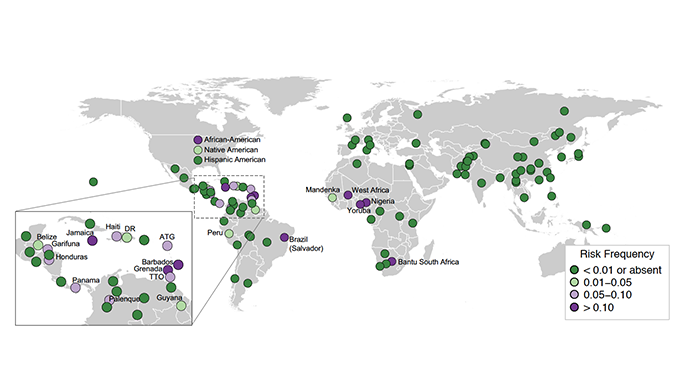Study Findings Highlight the Need for Diversity in Genomic Research
More than three-quarters of genomic data is derived from people of European descent, leaving other ethnic groups understudied. To address this problem, researchers from the Icahn School of Medicine at Mount Sinai, the Fred Hutchinson Cancer Research Center in Seattle, and a number of other academic centers have analyzed the genomes of nearly 50,000 non-European individuals to maximize genetic discovery and lessen clinical disparities. As described in a paper published today in Nature, this collaborative study revealed nearly 1,500 associations between genes and disease in minority populations, serving as a prime example of what racially inclusive research can bring.
The study, known as PAGE—Population Architecture using Genomics and Epidemiology—was founded by the National Human Genome Research Institute and National Institute on Minority Health and Health Disparities to research the correlation between genetics and disease in ethnically diverse individuals in the United States. In analyzing the genetic code of these diverse populations and comparing them to those of European descent, researchers identified 27 new genetic associations that have not been found previously in European populations, but have the potential to be transferable to other groups that share components of genetic lineage, such as African ancestry, which can be found in both African Americans and Hispanics/Latinos. Given that these two groups remain the most understudied populations in genomic research, Mount Sinai and Fred Hutchinson researchers are left wondering what other ancestral associations remain undiscovered.
“To date, millions of genomes have been sequenced, but ethnic diversity remains an unmet need,” said Eimear Kenny, PhD, Associate Professor of Medicine and Genetics at the Icahn School of Medicine at Mount Sinai, Director of the Center for Genomic Health, and co-senior author of the publication. “Because the availability of non-European genomic data is limited, much of the existing clinical therapies disproportionately benefit those of European descent – further widening the health disparities gap.”
Christopher Carlson, PhD, Associate Member of the Public Health Sciences Division at Fred Hutchinson and co-corresponding author of the publication, added, “Previous articles have alluded to the need for multi-ethnic diversity in genome-wide studies, but this study is among the first to clearly delineate the scope of the problem, using detailed analyses of minority genetic samples.”
As we enter an era of a more racially diverse America, the need to understand the genetic underpinnings of disease affecting nonwhites has become increasingly crucial—especially with the widespread adoption of precision medicine, a medical model focused on treating and preventing illness by means of genetic evaluation.
The newfound connections between genes and disease in ethnic minorities uncovered in this study not only indicate that we have more work to do, but most importantly, that an increase in analysis of non-European populations could mean increased clinical options for all.
About the Mount Sinai Health System
Mount Sinai Health System is one of the largest academic medical systems in the New York metro area, with 48,000 employees working across seven hospitals, more than 400 outpatient practices, more than 600 research and clinical labs, a school of nursing, and a leading school of medicine and graduate education. Mount Sinai advances health for all people, everywhere, by taking on the most complex health care challenges of our time—discovering and applying new scientific learning and knowledge; developing safer, more effective treatments; educating the next generation of medical leaders and innovators; and supporting local communities by delivering high-quality care to all who need it.
Through the integration of its hospitals, labs, and schools, Mount Sinai offers comprehensive health care solutions from birth through geriatrics, leveraging innovative approaches such as artificial intelligence and informatics while keeping patients’ medical and emotional needs at the center of all treatment. The Health System includes approximately 9,000 primary and specialty care physicians and 10 free-standing joint-venture centers throughout the five boroughs of New York City, Westchester, Long Island, and Florida. Hospitals within the System are consistently ranked by Newsweek’s® “The World’s Best Smart Hospitals, Best in State Hospitals, World Best Hospitals and Best Specialty Hospitals” and by U.S. News & World Report's® “Best Hospitals” and “Best Children’s Hospitals.” The Mount Sinai Hospital is on the U.S. News & World Report® “Best Hospitals” Honor Roll for 2025-2026.
For more information, visit https://www.mountsinai.org or find Mount Sinai on Facebook, Instagram, LinkedIn, X, and YouTube.
Researchers Identify Opportunities to Advance Genomic Medicine
Jan 27, 2020 View All Press Releases